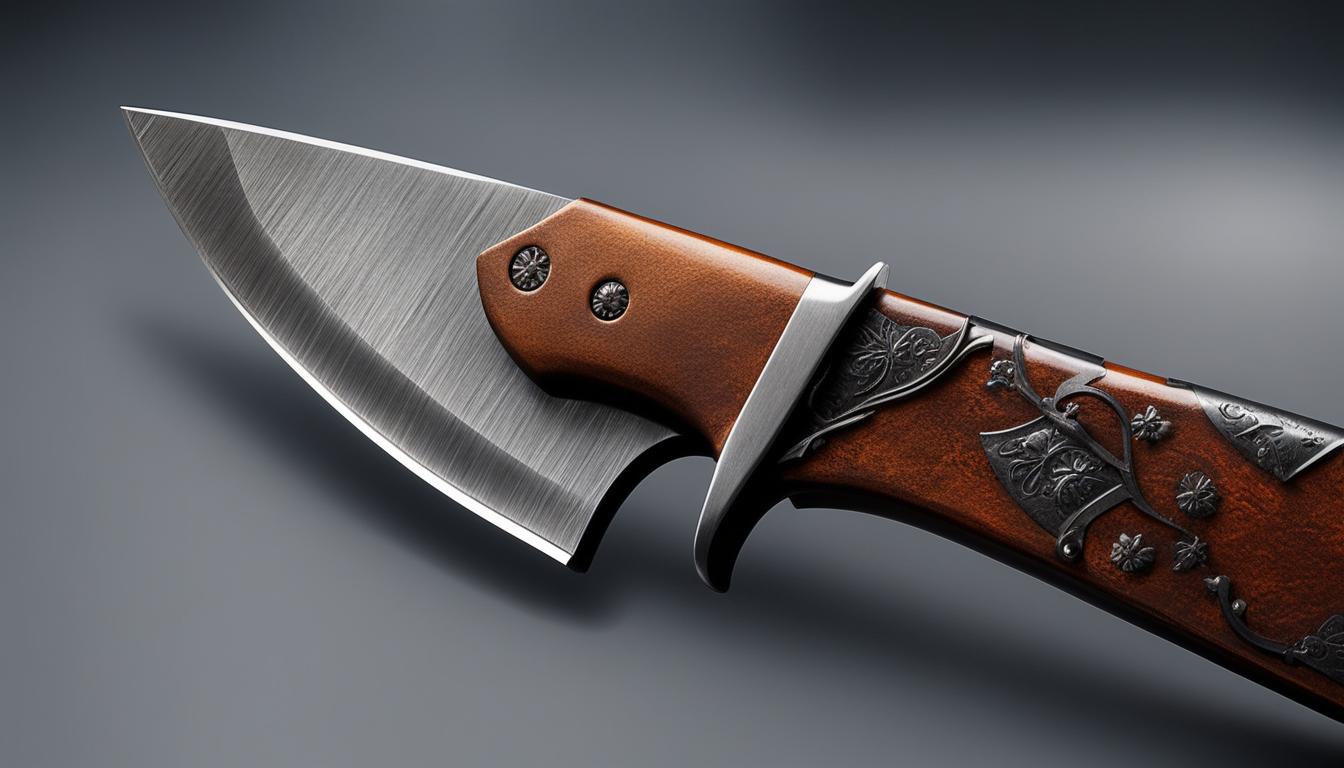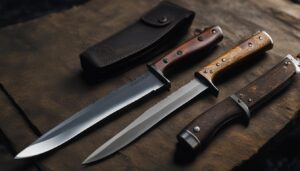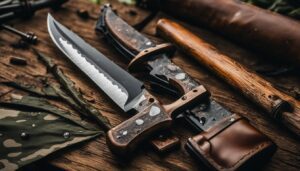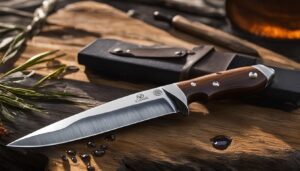Steel is naturally prone to rust, including carbon steel and stainless steel knives. While stainless steel is more resistant to corrosion, it can still rust with abuse or lack of care. To prevent rust on your hunting knives, it’s important to understand the difference between rust and patina. Montana Knife Company uses Parkerizing and Cerakote coatings to protect their blades from rust. To keep your knives from rusting, clean the blade thoroughly after each use, apply a protective wax, properly dry the sheath, and use a rust-free oil. Avoid exposing your knife to saltwater and choose the right materials, such as stainless steel, high carbon steel, ceramic, or titanium.
Key Takeaways
- Understanding the difference between rust and patina helps in preventing rust formation on hunting knives.
- Properly cleaning and drying the knife after each use is essential for rust prevention.
- Applying a protective wax and using a rust-free oil can help protect the knife from moisture.
- Avoid exposing the knife to saltwater and choose rust-resistant materials for your hunting knives.
Why Knives Rust and Factors That Contribute to Rust Formation
Understanding why knives rust and the factors that contribute to rust formation is crucial in preventing rust and preserving the longevity of your hunting knives. Rust forms on knives when iron in steel reacts with oxygen and water, resulting in the formation of iron oxide or rust. This chemical reaction is accelerated by certain factors that create an environment conducive to rust formation.
Moisture is one of the primary culprits when it comes to rust formation. When moisture is left on a knife, it can break down the metal and lead to rust. Oxygen also plays a vital role in rust formation as it reacts with iron to form rust. Knives used to cut food high in salt or acidic substances are more susceptible to rust due to the corrosive nature of these elements.
By understanding these factors, you can take preventive measures to protect your knives from rust. Properly cleaning and drying your knives after each use is essential to remove any moisture and prevent rust formation. Additionally, avoiding exposure to high levels of moisture, salt, and acids can significantly reduce the risk of rust. Choosing the right materials, such as stainless steel, high carbon steel, ceramic, or titanium, can also contribute to rust-proof knife techniques.
Factors Contributing to Rust Formation
| Factor | Effect on Rust Formation |
|---|---|
| Moisture | Breaks down the metal and accelerates rust formation. |
| Oxygen | Reacts with iron to form rust. |
| Salt | High salt content in food can corrode the knife and promote rust formation. |
| Acids | Acidic substances can have a corrosive effect on the knife, making it more prone to rust. |
By taking the necessary precautions to prevent exposure to these factors, you can minimize the risk of rust formation on your hunting knives. Regular cleaning, drying, and proper maintenance are essential in ensuring the longevity and performance of your knives. Stay tuned for the next section, where we will discuss proper cleaning and drying techniques to prevent rust.
Proper Cleaning and Drying Techniques
Properly cleaning and drying your hunting knives after each use is crucial in preventing rust formation. By following these cleaning and drying techniques, you can ensure the longevity and performance of your knives.
When it comes to cleaning, it is best to hand wash your knife using warm water and mild dish soap. Avoid using a dishwasher as the high heat and harsh detergents can damage the blade. Use a soft sponge or cloth to gently clean the blade, taking care not to scratch it. Rinse the knife thoroughly to remove any soap residue.
After cleaning, drying the knife is equally important. Use a clean, dry cloth to pat the blade dry immediately. Moisture left on the knife can lead to rust formation, so it is essential to remove all traces of water. Pay extra attention to drying the handle and any crevices where water might accumulate.
For added protection, consider applying a protective wax, such as MKC blade wax, after cleaning and drying. This wax creates a barrier that helps prevent moisture from getting underneath any scratches or imperfections in the blade’s coating. Simply apply a thin layer of wax using a cloth and buff it gently.
| Knife Cleaning Tips |
|---|
| Hand wash your knife with warm water and mild dish soap |
| Use a soft sponge or cloth to avoid scratching the blade |
| Dry the knife immediately and thoroughly after washing |
| Apply a protective wax, like MKC blade wax, after cleaning |
By following these proper cleaning and drying techniques, you can effectively prevent rust formation on your hunting knives and keep them in excellent condition for years to come.
Rust Prevention Techniques for Knife Maintenance
Proper maintenance is crucial to prevent rust formation on your hunting knives. By following these knife maintenance tips, you can keep your blades rust-free and in excellent condition for years to come.
Cleaning and Drying
One of the most important steps in preventing rust is to clean and dry your knives properly after each use. Hand washing with warm water and mild dish soap is recommended over using a dishwasher. Use a soft sponge or cloth to avoid scratching the blade, and make sure to dry the knife immediately after washing. Residual moisture can break down the metal and contribute to rust formation.
Regular Maintenance
In addition to cleaning and drying, regular maintenance is essential for rust prevention. After cleaning, apply a thin layer of food-grade mineral oil to the blade and handle. This oil acts as a barrier against moisture and helps protect the knife from rust. Regular sharpening is also important to maintain the knife’s performance and reduce the risk of rust formation.
Proper Storage
Proper storage plays a crucial role in preventing knife rust. Avoid leaving your knife in water or a damp environment, as this can lead to rust formation. Store your knives in a dry place, away from moisture and humidity. Consider using a knife block, a dedicated knife case, or hanging them on a magnetic strip to keep them safe and dry.
| Knife Maintenance Tips | Rust Prevention Techniques |
|---|---|
| Clean the blade thoroughly after each use | Prevents moisture buildup and rust formation |
| Apply a thin layer of food-grade mineral oil | Acts as a barrier against moisture |
| Regularly sharpen the knife | Maintains performance and reduces rust risk |
| Store in a dry place | Avoids exposure to moisture and humidity |
Choosing the Right Materials for Rust Prevention
When it comes to preventing rust on your hunting knives, choosing the right materials is essential. Different knife materials offer varying levels of resistance to rust and corrosion. By selecting the right materials, you can ensure that your knives stay rust-free and in top condition.
One popular choice for rust-resistant knives is stainless steel. Stainless steel is highly resistant to rust and corrosion, making it an excellent option for hunting knives. Another material to consider is high carbon steel, which not only offers exceptional sharpness and edge retention but also has rust-resistant properties.
If you prefer a lightweight option, ceramic knives are a great choice. Ceramic is highly resistant to rust and corrosion, and it offers the added benefit of being lightweight and easy to maneuver. Titanium knives are also worth considering, as titanium is known for its strength and durability while being resistant to rust.
The Benefits of Coatings
Coatings are another way to enhance the rust resistance of your hunting knives. Two popular coating options are Cerakote and Diamond-Like Carbon (DLC). These coatings provide an additional barrier against moisture and oxidation, further reducing the risk of rust formation. Cerakote, in particular, offers excellent durability and corrosion resistance.
With the right materials and coatings, you can significantly reduce the chances of rust forming on your hunting knives. Remember to choose stainless steel, high carbon steel, ceramic, or titanium knives and consider adding a protective coating for extra rust prevention. By investing in high-quality materials, you’ll ensure that your knives remain in pristine condition for years to come.
Summary:
- Choose materials such as stainless steel, high carbon steel, ceramic, or titanium for rust-resistant knives.
- Consider adding coatings like Cerakote or Diamond-Like Carbon (DLC) for enhanced rust resistance.
- Stainless steel offers high resistance to rust and corrosion.
- High carbon steel combines sharpness and edge retention with rust-resistant properties.
- Ceramic knives are lightweight and highly resistant to rust.
- Titanium knives are known for their strength, durability, and rust resistance.
Table:
| Knife Material | Key Benefits |
|---|---|
| Stainless Steel | High resistance to rust and corrosion |
| High Carbon Steel | Sharpness, edge retention, and rust-resistant properties |
| Ceramic | Lightweight and highly resistant to rust |
| Titanium | Strength, durability, and rust resistance |
Conclusion
Preventing rust on hunting knives is crucial to maintain their longevity and performance. By implementing effective knife rust prevention techniques, you can ensure that your knives stay rust-free and in optimal condition for years to come.
Proper cleaning and drying techniques are essential in preventing knife rust. Always hand wash your knives with warm water and mild dish soap, and make sure to dry them thoroughly immediately after washing. Applying a protective wax like MKC blade wax can further prevent moisture from seeping into scratches in the coating.
Regular maintenance is key to keeping knives rust-free. After cleaning, it is recommended to apply a thin layer of oil, such as food-grade mineral oil, to the blade and handle. Additionally, storing your knives in a dry place away from moisture and humidity will prevent rust formation.
Choosing the right materials for your knives is another effective rust prevention technique. Materials such as stainless steel, high carbon steel, ceramic, and titanium are all excellent options for rust-resistant knives. Some knives also come with coatings like Cerakote or Diamond-Like Carbon (DLC) for added rust protection.
By understanding the factors that contribute to rust formation and implementing preventive measures, you can keep your hunting knives rust-free, sharp, and in excellent condition. Remember to always dry your knives thoroughly, apply protective coatings or oils, and store them in a dry and safe place to prevent rust and maintain their optimal performance.
FAQ
How can I prevent rust on my hunting knives?
To prevent rust on your hunting knives, it is important to clean and dry the blade thoroughly after each use, apply a protective wax, properly dry the sheath, and use a rust-free oil. Avoid exposing your knife to saltwater and choose materials such as stainless steel, high carbon steel, ceramic, or titanium.
What causes rust on knives?
Rust forms on knives when iron in steel reacts with oxygen and water, resulting in the formation of iron oxide or rust. Factors that contribute to rust formation include moisture, oxygen, salt, and acids.
How should I clean and dry my knives to prevent rust?
Properly cleaning and drying knives after each use is essential to prevent rust formation. Hand wash the knife with warm water and mild dish soap, use a soft sponge or cloth to avoid scratching the blade, and dry the knife immediately after washing. Applying a protective wax after cleaning helps prevent moisture from getting underneath scratches in the coating.
How often should I perform maintenance on my knives to prevent rust?
Regular maintenance is key to keeping knives rust-free. It is recommended to apply a thin layer of oil to the blade and handle after cleaning, regularly sharpen the knife, and store it in a dry place away from moisture and humidity.
What materials are less prone to rust and corrosion?
Stainless steel, high carbon steel, ceramic, and titanium are all good options for rust-resistant knives. Stainless steel is highly resistant to rust and corrosion, high carbon steel offers sharpness and edge retention, ceramic knives are lightweight and highly resistant to rust, and titanium knives are strong and durable.





